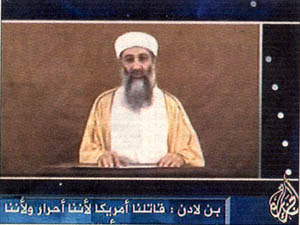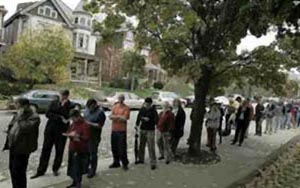 |
Socio-Political Issues
Lessons from the elections
Approval of the War & Other Issues
Atila S. Guimarães
As the emotions of the election race start to calm down, it is time to draw some lessons from it.
The main lesson of this election, in my opinion, regards the war. The most controversial plank on Bush’s platform was the war against terrorism, which Kerry combated by calling it “the wrong war, in the wrong place and at the wrong time.”
From the beginning to the end of his campaign, however, the Senator displayed his remarkable chameleon talent to adapt his opinions to the different audiences he was addressing. Curiously, either these Democratic audiences are not so opposed to the war as the liberal media lets one imagine, or they became more favorable as the political campaign reached its end.
These are the only inferences that occur to me to explain the following statement Kerry made on October 29 in Palm Beach, Florida:
“Let me make it clear – crystal clear. As Americans, we are absolutely united in our determination to hunt down and destroy Osama bin Laden and the terrorists. They are barbarians. And I will not stop at absolutely nothing to hunt down, capture or kill the terrorists wherever they are, whatever it takes. Period” (Los Angeles Times, October 30, 2004).
So, the Democrat candidate who some months ago said that the war against terrorism was “the wrong war” finished his campaign declaring himself “absolutely united” with all Americans in the determination “to hunt down and destroy the terrorists.” Therefore, for Kerry, the “wrong war” became a just war.
The Senator had affirmed also that the war was being waged “at the wrong time.” In the mentioned speech, however, speaking to present day needs, he emphasized that he would “stop at absolutely nothing to capture or kill terrorists.” One could say that Kerry became a radical apologist for violent action. Again, a substantial change.
Finally, he had declared that the war was being waged “in the wrong place,” that is, Iraq. At the end of his campaign, however, he stressed that he would fight terrorists “wherever they are,” i.e., even in Iraq. Once more, Kerry indirectly acknowledged his error. This statement is undeniably a precious morsel in the war controversy that should not be wasted. The bitter enemy of war yesterday became today’s supporter.

Osama Bin Laden threatens America in the video released before the election - LA Times, October 30, 2004
|
What is behind such a change? I don’t exclude, of course, a sincere and noble recognition of his past mistake. It is more probable, however, that he changed because public opinion changed, that is, for opportunist reasons. But why did his public change? On October 28, the day before his Palm Beach statement, a video-tape of Bin Laden was made public. In it the terrorist leader tried to manipulate the American presidential election by intimidating the people. He threatened that another “Manhattan” could be repeated, and gave this warning:
“Your security is in your own hands. Any nation that does not attack us will not be attacked." (full text, click here).
The video was intended to raise fear in the nation to drag votes from Bush to Kerry. It produced the opposite reaction. American public opinion became indignant over the arrogance of Bin Laden and reaffirmed its support for the war. This indignation arose not only in the Republican electorate, but also among Democrats. Many persons who were undecided about the war realized how dangerous the situation was and the need for a strong response in fighting the war on terrorism.
So, to stop an unexpected hemorrhage and avoid any suspicion he might have had a hand in the video, Kerry felt himself obliged to attack terrorism and Bin Laden.
The video misfire
Regarding the Bin Laden video, it is interesting to observe that he - or whoever was directing him - made a huge mistake by intruding into the American political race. If he was the brain behind the scheme to blow up four trains in Madrid last March, certainly his act was abominable but also it was intelligent. The public panicked; Spain turned its back on its honor and its glorious past, and elected the socialist Zapatero to avoid irritating the terrorists. That reaction was shameful for Spain, but a success for one who master-minded the plan. He could boast that by detonating a few bombs at the right moment, he conquered a whole country. An adapted version of the formula didn’t work in United States. It produced the opposite result. Bin Laden and his boss missed the target.
The Jewish vote
Regarding statistics about voting patterns in this election, it seems worthwhile to point out that 74% of the Jewish Americans voted for Kerry, and only 25% for Bush (CNN.com). I had read some 15 days before the elections a similar statistic about the war, that is, some 75% of the Jews were against it. I thought: “If the war was launched to favor Zionism, as some conservatives pretend, the majority of Jews would approve it.” In fact, they don’t.

Voters waiting in long lines in Columbus, OH - Ohio was one of the 11 states that rejected the "marriage" for homosexuals amendment
|
Moral values
Regarding American affairs on the home front, even the secular media is acknowledging that this election proved that moral issues – the rejection of abortion and "marriage" for homosexuals – matter a great deal to the American electorate. I agree, and believe congratulations are in order.
The Catholic vote
If one considers that today around 65 million Americans are Catholics – less than the ensemble of the Protestants but more than any one of their multiple denominations (1) – it is not difficult to realize the real importance of the Catholic vote. Since 52% of Catholics cast their ballots for Bush and 47% for Kerry (CNN.com), this difference of 5% can have contributed decisively to the 3.5 million more votes that Bush received over Kerry (US Today.com) and that gave him the victory.
If this is admitted as a possibility, the next question necessarily arises: Why would a considerable sector of Catholics vote for the Protestant Bush rather than the Catholic Kerry? It is my opinion that the recent controversy over whether Catholic politicians who support abortion are excommunicated or not played a notable role in determining the final position of the Catholic vote. It is an important confirmation of the damage such misgivings can cause for a Catholic candidate.
1. As of 2003, there are over 65.2 million Catholics in the United States, approximately 23% of the population. This is about four times the size of the next largest denomination, the Southern Baptist Convention.

Posted November 5, 2004

Related Topics of Interest
 The Vatican Pulls a Kerry - Flip-flops on Heretical Politicians The Vatican Pulls a Kerry - Flip-flops on Heretical Politicians
 Kerry Receives Communion in Boston Kerry Receives Communion in Boston
 The Confused “Clear Teaching” of the Bishops The Confused “Clear Teaching” of the Bishops

|
Social-Political | Hot Topics | Home | Books | CDs | Search | Contact Us | Donate

© 2002- Tradition in Action, Inc. All Rights
Reserved
|
 |
|